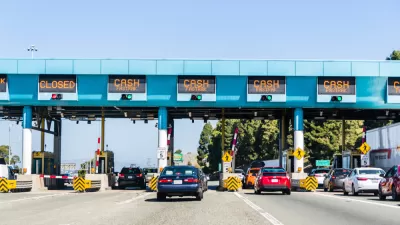A short term increase in spending hides California's annual structural deficit of almost $6 billion—money needed to maintain the state's roads and bridges.
"With nearly $7 billion in unexpected revenues the budget is now the highest in state history at more than $115 billion," writes Gene Haagenson of ABC Action News in Fresno about the May revision.
While transportation spending will increase, it won't nearly be enough to meet road and bridge maintenance and rehabilitation needs. Josh Richman of Bay Area News Group indicates the two increases to transportation funding in the revision:
- Brown's proposal would boost general-fund spending on transportation from $200 million in the current year to $261 million in 2015-15, a 30.5 percent increase.
- There's also $8.86 billion in special funds and $2.1 billion in bond funds earmarked for transportation, bringing next year's total to about $11.2 billion.
On May 8, the California Department of Transportation (Caltrans) released a 10-year planning report detailing the spending shortfall. "California needs an additional $5.7 billion per year to maintain its roads," writes Robin Respaut for Reuters. The report indicates that Caltrans "would need about $8 billion annually for the next 10 years to reach management and improvement goals for its highway system, but only $2.3 billion annually has been budgeted."
Caltrans said it needed the funding for critical infrastructure projects to roadways and bridges planned over the next decade. There are more than 50,000 state highway lane miles and more than 13,000 bridges across the state.
The Caltrans report appears consistent with Gov. Jerry Brown's infrastructure goal mentioned in his January inauguration/state of the state address to fund the $59 billion backlog of deferred highway and bridge maintenance.
Meanwhile, the state's 36 cents per gasoline excise tax will drop six cents come July 1 due to a February 24 vote by the Board of Equalization. And Richman reminds readers that "gas-tax revenue is decreasing as cars become more fuel efficient and some drivers switch to hybrids or electric cars -- good for the environment, but bad for highways."
To address the shortfall, the state legislature passed one measure last year and is considering tax and fee increases this year:
- A pilot program to enact a road user charge, aka vehicle-miles-traveled fee or mileage-based-user fee thanks to the passage of SB 1077 last year, described here most recently. However, Richman writes that "implementation of a broader statewide program is not likely for a number of years."
- A flat, annual registration fee of about $50 favored by Assembly Speaker Toni G. Atkins.
- SB 16, proposed by Senate Transportation Chairman Jim Beall, would increase the gas tax 10 cents per gallon, the diesel tax by 12 cents per gallon, add a new $100 annual fee for electric vehicles, increase vehicle registration fees by $35 for all motor vehicles, and incremental increase the Vehicle License Fee by .35%. [See legislation].
Richman adds a "bright spot" resulting "from the state's cap-and-trade program to reduce greenhouse-gas emissions: $1.6 billion went to clean-transportation and mass-transit uses starting in the current budget year."
- $500 million directed to California High-Speed Rail
- $100 million for transit operations in the Low Carbon Transit Operations Program
- $265 million for rail and transit in the Transit and Intercity Rail Capital Program
- $400 million goes to the Affordable Housing and Sustainable Communities Program, which funds land-use, housing, transportation, and land-preservation projects to support infill and compact development
- $350 million goes to the Air Resources Board's clean transportation programs.
Bottom line: a lot is riding on SB 16.
FULL STORY: Not enough money for highway repairs, Brown's budget acknowledges

Alabama: Trump Terminates Settlements for Black Communities Harmed By Raw Sewage
Trump deemed the landmark civil rights agreement “illegal DEI and environmental justice policy.”

Study: Maui’s Plan to Convert Vacation Rentals to Long-Term Housing Could Cause Nearly $1 Billion Economic Loss
The plan would reduce visitor accommodation by 25% resulting in 1,900 jobs lost.

Planetizen Federal Action Tracker
A weekly monitor of how Trump’s orders and actions are impacting planners and planning in America.

Wind Energy on the Rise Despite Federal Policy Reversal
The Trump administration is revoking federal support for renewable energy, but demand for new projects continues unabated.

Passengers Flock to Caltrain After Electrification
The new electric trains are running faster and more reliably, leading to strong ridership growth on the Bay Area rail system.

Texas Churches Rally Behind ‘Yes in God’s Back Yard’ Legislation
Religious leaders want the state to reduce zoning regulations to streamline leasing church-owned land to housing developers.
Urban Design for Planners 1: Software Tools
This six-course series explores essential urban design concepts using open source software and equips planners with the tools they need to participate fully in the urban design process.
Planning for Universal Design
Learn the tools for implementing Universal Design in planning regulations.
Caltrans
Smith Gee Studio
Institute for Housing and Urban Development Studies (IHS)
City of Grandview
Harvard GSD Executive Education
Toledo-Lucas County Plan Commissions
Salt Lake City
NYU Wagner Graduate School of Public Service



























